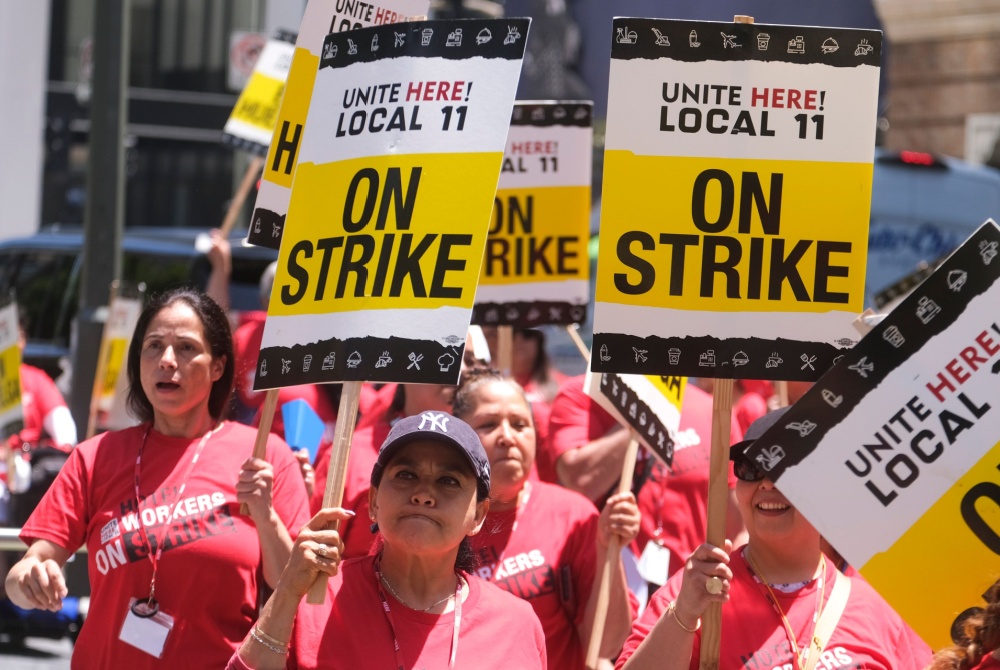
As we approach the end of summer and welcome the coming autumn, some workers took a day off to celebrate Labor Day in recognition of the achievements of the American labor movement and workers’ contributions to the nation’s “strength, prosperity and wellbeing.” Labor Day traces its origins back to the 19th century, when activists wanted to establish a day to recognize workers. While Labor Day today is often synonymous with holiday sales, a new school year and football season, it’s important to keep workers’ ongoing struggles in mind, both in the U.S. and around the world.
In the U.S., according to a Reuters analysis of data from the U.S. Bureau of Labor Statistics, union membership hit a record low in 2023, with only 1 in 10 American workers belonging to a union. Wages have not kept pace with inflation, and income inequality continues to rise. Gig workers are often excluded from basic labor protections like minimum wage, overtime pay and the right to a safe work environment. Domestic workers face many of the same issues. And increasing reliance on artificial intelligence in the workplace has threatened jobs and workers’ rights. We’ve already seen a number of recent strikes related to the use of AI in creative industries, including the 2023 Writers Guild of America and SAG-AFTRA strikes and the ongoing Hollywood video game performers strike.
With the exception of a few funders, support for workers and labor rights is not a prime focus for philanthropy, which more often approaches questions of employment and economic opportunity by backing less-politicized and less-confrontational strategies like job training and workforce development. But with nonprofit organizations playing a key role in the new labor movement as flagging union membership caused a decline in the traditional revenue stream of dues, philanthropic funding remains vital in this space — despite the fact that direct support for unions is off the table for most U.S. philanthropies.
Following this Labor Day weekend, we’re spotlighting some of philanthropy’s recent efforts to protect and advance the rights of workers, both in the U.S. and around the globe.
In the U.S., the Ford Foundation, Open Society Foundations, W.K. Kellogg Foundation and Surdna Foundation teamed up with the AFL-CIO and SEIU to support a new initiative from the LIFT Fund called the Southern Workers Opportunity Fund. This new fund is dedicated to investing in “ecosystems to increase worker power, improve the economic livelihood and social conditions for workers in the South, and help build a democratic economy that fully values workers as people first.”
There are several funders in California supporting workers. The James Irvine Foundation, for example, is dedicated to supporting low-income workers and economic opportunity in California, and backs the LIFT Fund’s efforts in the state. General Service Foundation, a small family foundation established by a couple who made their fortune in the lumber industry, has been supporting labor rights since 1995. And the Rosenberg Foundation has been at the forefront of supporting migrant agricultural workers and their rights for decades, as well as domestic workers and workers in the garment, restaurant and car wash industries.
In a guest post this spring, Rutgers University Professor Janice Fine called the Deferred Action for Labor Enforcement program (DALE) the “best pro-worker policy that nobody has heard of,” and urged philanthropic funders to support organizations that are helping workers apply for DALE.
IP has also provided ongoing coverage of burnout among nonprofit workers, including what funders can do to fight the crisis, what nonprofit burnout looks like from funders’ points of view, and the activities of organizations advocating for better pay and working conditions.
Pro-labor U.S. funders have also been active abroad. The Ford Foundation, for example, has been supporting workers’ rights in the Global South for several years. In collaboration with the Laudes Foundation and the Open Society Foundations, Ford helped launch the Labora Fund to advance and protect labor rights in Brazil, focusing particularly on marginalized workers who aren’t typically covered by labor and social protections, including workers in the informal economy, migrant workers, Indigenous communities and people with disabilities.
Ford also funded a report that looked at the impacts of the digitalization of the economy on workers and their rights, especially in the Global South.
Last year, a group of funders, including Ford, Humanity United and the Open Society Foundations, joined the Biden administration’s Multilateral Partnership for Organization, Worker Empowerment and Rights (M-POWER) initiative, a cross-sector partnership dedicated to supporting workers’ rights as a principle of democracy. Other governments participating in M-POWER include those of Argentina, Canada, South Africa and Spain. The initiative is seeking to strengthen free and independent trade unions, support labor law reform and enforcement, and extend labor laws to protect workers in vulnerable sectors.
There have been wins and losses for labor in recent years, but one thing is clear: Workers’ rights remain under attack. In August, during a two-hour interview on X, Donald Trump and Elon Musk praised the firing of employees who threaten to strike — even though the right to strike is protected by federal labor laws. In response, the United Auto Workers union filed federal labor charges against Trump and Musk.
Starting in 2021, workers at Starbucks locations voted to unionize, and in 2023, thousands of employees went on strike to demand better pay and working conditions. Starbucks has been accused of union busting and retaliation against pro-union employees.
Given these and other ongoing threats against workers and their rights, the question remains: will more philanthropic funders overcome this sector’s traditional reticence to back labor advocacy and step up for workers?
Editor’s Note: This article has been updated to reflect the fact that the James Irvine Foundation supports the LIFT Fund’s efforts in California, but not nationally.
